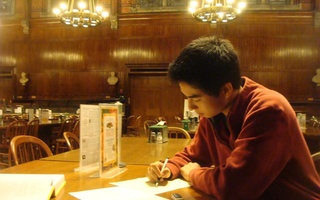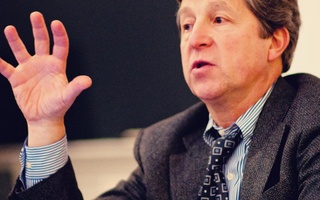Mentioning friends elicits a stronger brain response in subjects than mentioning strangers, according to a study published yesterday in the Journal of Neuroscience.
The study, conducted over two years ago at the Cognitive Neuroscience Laboratory at Harvard, sought to determine whether social alliances or social similarities had a greater impact, psychology graduate student and lead author Fenna M. Krienen said.
Though Krienen had hypothesized that mention of similar people would stimulate the brain more than mention of dissimilar people, the study found that only social closeness affected the strength of the brain response.
Subjects were required to answer online questions and write short biographies of themselves and two friends before participating in the study. Researchers then synthesized biographies of two strangers and used the two fictitious strangers and the two friends submitted by the subject to conduct the study.
Krienen asked participants questions about similar friends and strangers.
Krienen said the fictitious strangers were as similar to the subject as the friends the subject described.
She said that in order to get the participants deeply engaged, she asked the participants questions about day-to-day preferences like "would this person prefer doing laundry to grocery shopping" or "would this person rather sit in the aisle seat or the window seat on an airplane."
When researchers asked subjects questions about the friends they submitted, brain activity increased, but when researchers asked subjects about strangers, even those who were similar to them, there was no activity.
Additionally, Krienen said the research indicated that the same area of the brain involved in speculating at friends’ decision-making and preferences also processed personal preferences.
Krienen suggested that this data could be used in future studies to examine whether subjects with social disorders like autism and schizophrenia took a different approach to comparing others’ preferences with their own.
According to Krienen, the study might also lead the lab to conduct future studies to determine whether non-social tasks trigger the same area of the brain as social tasks.
Read more in News
Mark Vonnegut Comes to Harvard BookstoreRecommended Articles
-
 When and Where Not To Brain Break
When and Where Not To Brain Break -
 Annenberg Makes Its Social Space Debut
Annenberg Makes Its Social Space Debut -
Exercise, Diet Help Relieve StressA Rockefeller University scientist, speaking at a discussion hosted by the Mind/Brain/Behavior Initiative Tuesday, said that anxiety may have more negative health effects than commonly expected.
-
Students Embrace Annenberg As Nighttime HangoutSince the College extended the hours that Annenberg is open to students in mid-September, some freshmen say they have been taking advantage of the later hours.
-
 HMS Professor Studies Orphanage Impact on Brain Development
HMS Professor Studies Orphanage Impact on Brain Development -
Scientist Portrait: Dr. Jeff LichtmanJeff Lichtman, a professor in the Neuroscience Department at Harvard, was recently lauded for his work with cutting-edge brain imaging techniques. The Crimson sat down with him to discuss his work.













